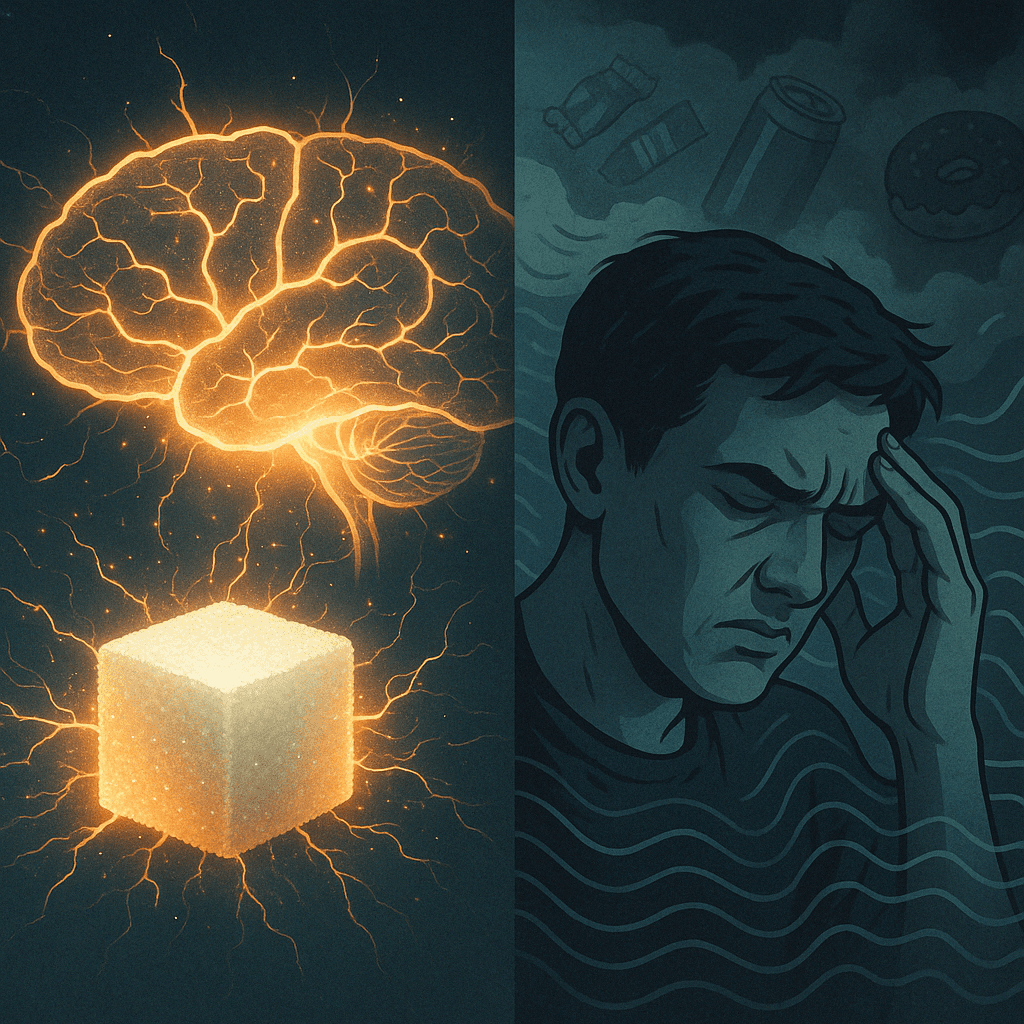The Hidden Relationship Between Sugar and Anxiety: Why It Matters More Than Ever
Sugar is deeply woven into modern life—found not only in sweets and desserts but also hidden in savory items, condiments, beverages, and packaged meals. While the health impacts of sugar on obesity, diabetes, and heart disease are well known, its influence on mental well-being remains less discussed. However, a growing body of research now points to a significant connection between sugar and anxiety, offering new insights into how our dietary choices may influence emotional resilience, stress responses, and psychological health. For those living with an anxiety disorder or struggling with chronic stress, reducing sugar may be a powerful, evidence-based way to reclaim a greater sense of mental balance.
You may also like: Why Am I Craving Sweets All of a Sudden? Expert-Backed Reasons and How to Stop Sugar Cravings Naturally
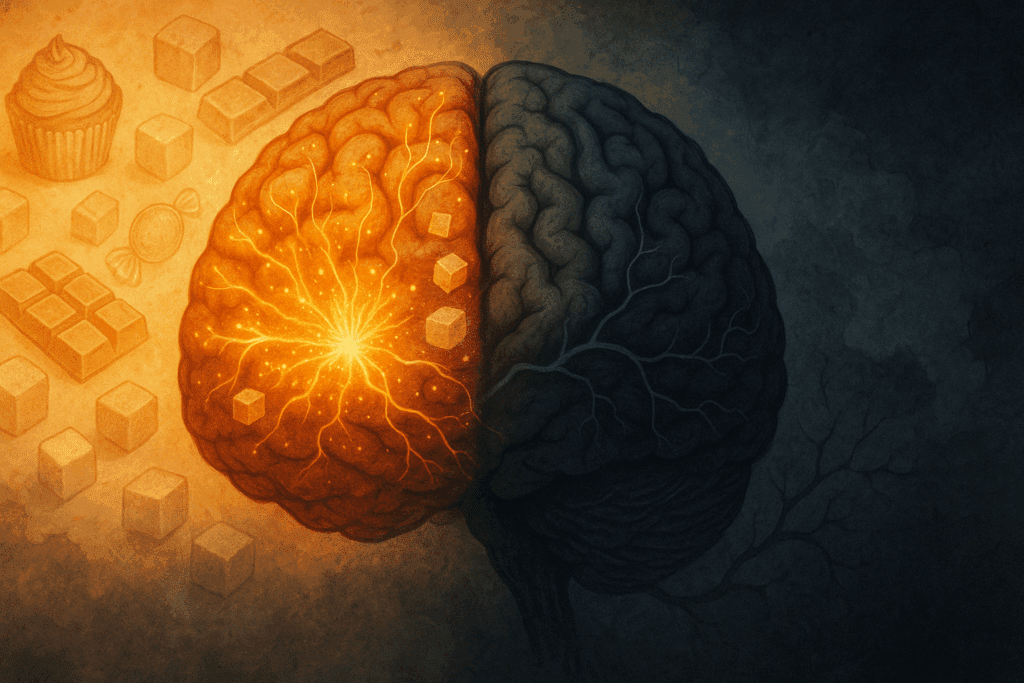
How Sugar Affects Brain Chemistry and Mood Regulation
To understand how sugar and anxiety are linked, it’s important to explore what sugar actually does in the brain. When we consume sugar—especially in large quantities—it rapidly increases glucose in the bloodstream. This sharp rise triggers a dopamine surge in the brain, activating reward pathways associated with pleasure and craving. While this might create a temporary sense of euphoria or comfort, it also primes the brain for dependence, leading to cycles of craving, withdrawal, and repeated consumption. These dopamine fluctuations may heighten emotional reactivity and reduce the brain’s ability to self-regulate, contributing to increased anxiety over time.
Moreover, chronic sugar intake can impair the brain’s production of serotonin, the neurotransmitter that helps stabilize mood, regulate sleep, and promote calmness. When serotonin levels drop, anxiety symptoms can worsen. This is particularly relevant for individuals with a sugar and anxiety disorder, where both biological and psychological vulnerabilities may be at play. Over time, sugar-induced neurochemical imbalances may deepen anxiety cycles, especially when paired with other stressors.
Another crucial aspect is inflammation. High sugar consumption promotes systemic inflammation, including neuroinflammation, which disrupts brain function and emotional stability. Inflammation of neural tissues can interfere with communication between brain regions involved in fear responses, decision-making, and mood regulation—further intensifying anxiety symptoms.
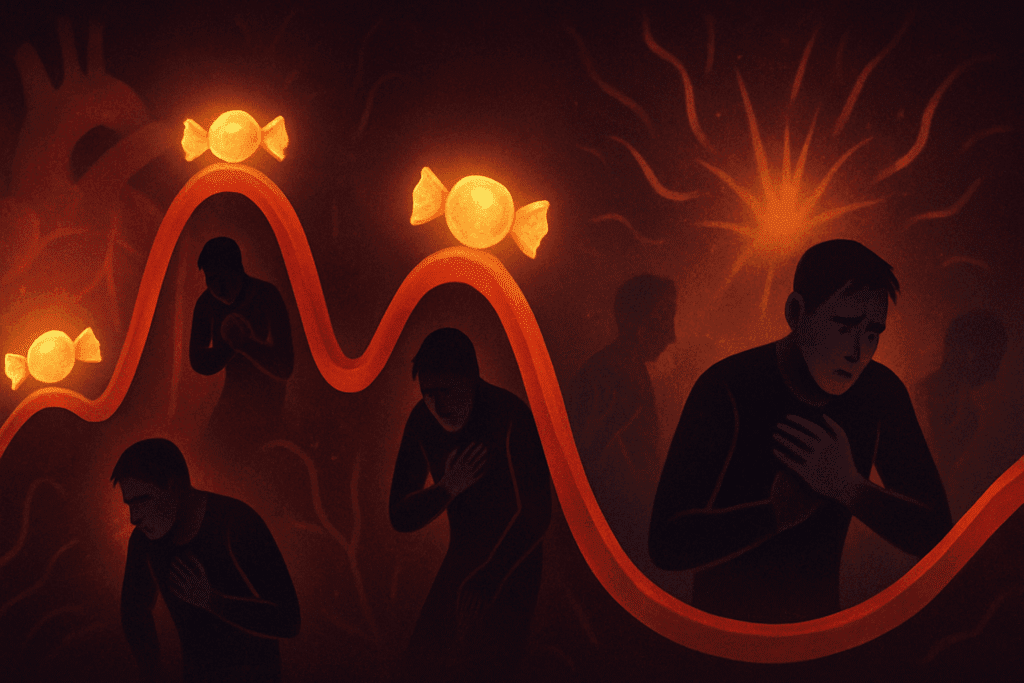
Blood Sugar Swings and the Fight-or-Flight Response
Beyond neurotransmitters, sugar plays a major role in blood sugar regulation, which is tightly linked to anxiety. Consuming refined sugars causes blood glucose levels to spike rapidly. But what goes up must come down, and soon after a sugar high, insulin brings blood sugar crashing down. These hypoglycemic episodes can trigger classic anxiety symptoms—shakiness, irritability, heart palpitations, lightheadedness, and panic. For many, these symptoms are misattributed to emotional or psychological distress when they are actually metabolic in origin.
The body’s fight-or-flight response is also activated during rapid blood sugar drops. When glucose levels fall too low, the brain perceives it as a survival threat and triggers a stress response by releasing cortisol and adrenaline. This hormonal cascade increases alertness and primes the body to escape danger—but in a non-dangerous situation, it creates a false sense of alarm. The result is heightened anxiety, restlessness, or even panic attacks. This feedback loop can become especially harmful in individuals already prone to anxiety disorders.
In fact, one of the most common patterns in the sugar and anxiety disorder connection is the cyclical nature of sugar-triggered panic symptoms. Individuals may consume sugar to soothe themselves emotionally, only to find that the aftereffects—adrenal spikes and blood sugar crashes—exacerbate their anxiety. Understanding this cycle is essential to breaking it.
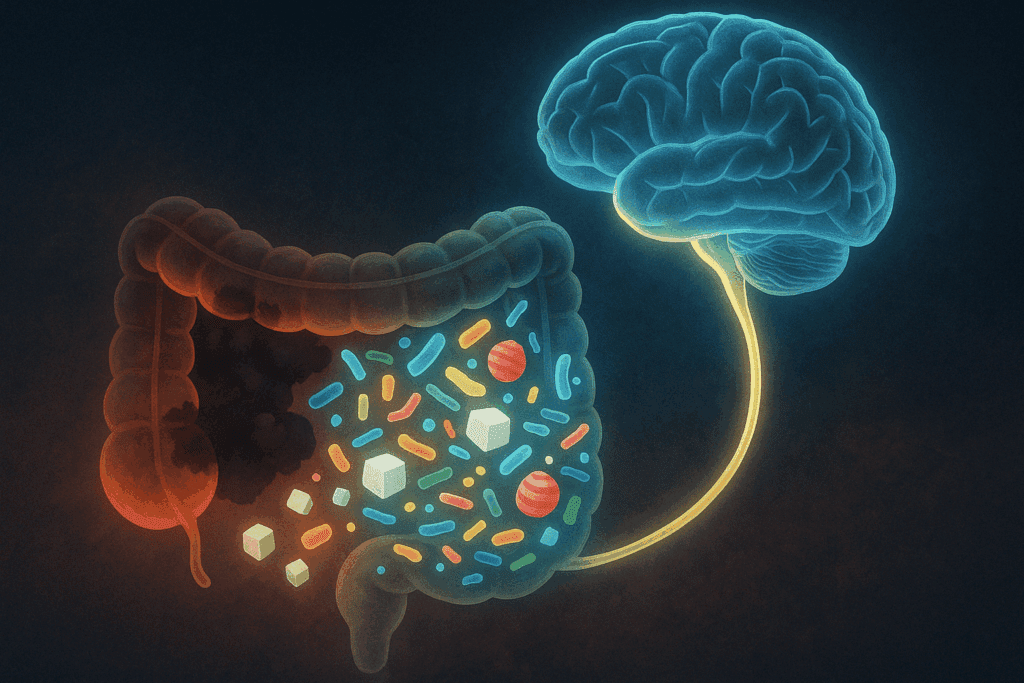
The Role of the Gut-Brain Axis in Sugar and Anxiety
An emerging area of research that sheds light on the sugar-anxiety link is the gut-brain axis. This bidirectional communication network between the gastrointestinal system and the central nervous system plays a central role in emotional health. A healthy gut microbiome helps regulate mood and cognition by producing neuroactive compounds like serotonin and GABA, which are essential for calming the nervous system.
Unfortunately, diets high in added sugars can disrupt the gut microbiota, feeding harmful bacteria and suppressing beneficial strains. This imbalance—known as dysbiosis—can lead to increased gut permeability or “leaky gut,” where bacterial toxins seep into the bloodstream and trigger systemic inflammation. This not only impairs digestion and immune function but also interferes with mental health. Numerous studies have shown that individuals with anxiety disorders often have altered gut flora, suggesting a strong link between microbial health and emotional resilience.
Additionally, sugar-related gut inflammation can impair the vagus nerve’s ability to communicate signals of calm between the gut and the brain. When this pathway is disrupted, the body remains in a state of chronic sympathetic nervous system activation—commonly known as “fight or flight.” Over time, this can lead to anxiety disorders that are resistant to psychological interventions alone, making dietary adjustments an important therapeutic tool.
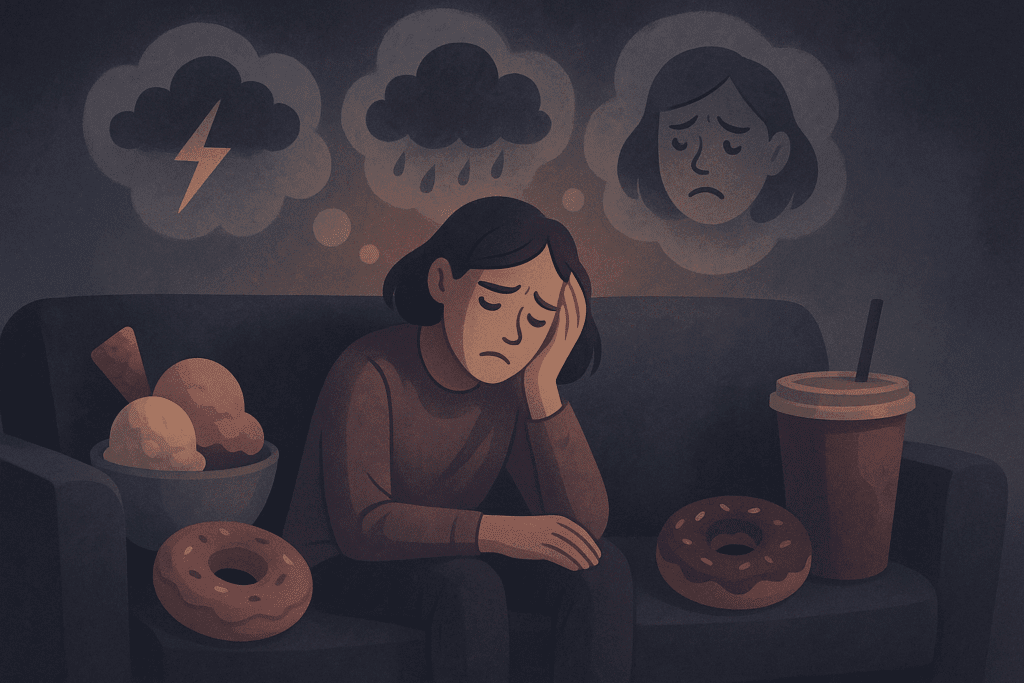
Emotional Eating, Cravings, and the Sugar-Anxiety Cycle
For many people, sugar is more than a food—it’s a coping mechanism. The emotional pull of sugary treats in moments of stress or sadness is well documented, with individuals often turning to sugar for comfort, distraction, or mood enhancement. However, this short-term relief is followed by long-term consequences. Emotional eating creates a feedback loop where sugar temporarily soothes anxiety, but then worsens it due to the biological effects discussed earlier.
This cycle is particularly evident in individuals with a diagnosed sugar and anxiety disorder. They may be more sensitive to internal stress cues and external stressors, making them more likely to rely on sugar as an emotional crutch. Unfortunately, frequent sugar consumption reinforces neural pathways related to reward-seeking behavior and emotional dependence, making it harder to break the habit.
Interestingly, research has found that people with higher anxiety levels report more intense cravings for high-sugar, high-fat foods. This may be the body’s attempt to self-medicate or stabilize mood, but in the long term, it only contributes to the deepening of anxiety symptoms. Breaking this cycle requires not only willpower but also strategic dietary changes and psychological support to build healthier coping mechanisms.
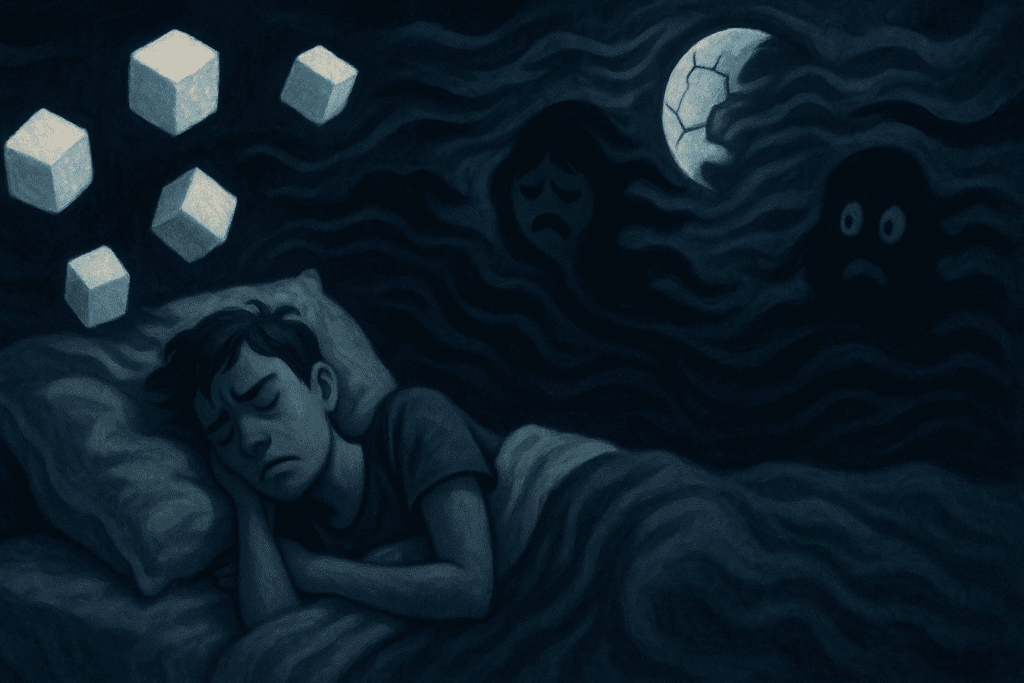
Sugar, Sleep Disruption, and Its Downstream Effects on Anxiety
Sleep quality is a powerful regulator of emotional health, and sugar has a surprisingly large impact on sleep architecture. High sugar intake—particularly in the hours before bed—can disrupt circadian rhythms, decrease slow-wave (deep) sleep, and increase nighttime wakefulness. This is due in part to the effect of sugar on cortisol and insulin levels, which can keep the brain in a hyperactive state when it should be preparing for rest.
Poor sleep, in turn, is one of the strongest predictors of increased anxiety. Even a single night of inadequate sleep can make the brain more reactive to stress and impair cognitive function, making it harder to manage anxious thoughts. Chronic sleep deprivation caused by sugar-related insomnia creates a perfect storm: a tired brain with weakened executive functioning and amplified emotional responses.
People who suffer from both insomnia and anxiety may find that reducing sugar in their diet improves not just mood but sleep quality as well. Emerging studies suggest that a low-sugar diet may help stabilize sleep cycles, reduce nighttime cortisol spikes, and promote deeper, more restorative rest—all of which are essential for anxiety management.
The Impact of Sugar During Critical Developmental Stages
Children, adolescents, and young adults are particularly vulnerable to the impact of sugar on mental health. During periods of rapid brain development, such as adolescence, excessive sugar intake can interfere with the formation of healthy neural connections and emotional regulation pathways. Studies show that high sugar diets in youth are associated with increased risk of depression, attention disorders, and anxiety symptoms later in life.
This early exposure to sugar also sets the stage for long-term metabolic disruption. Children who grow up consuming high amounts of sugar are more likely to develop insulin resistance, gut microbiome imbalances, and poor dietary habits that persist into adulthood. The combination of these physical changes with developing emotional systems may predispose individuals to lifelong struggles with anxiety, particularly in environments that lack nutritional education or access to healthier foods.
Parents and caregivers play a pivotal role in shaping early dietary habits. Educating families about the link between sugar and anxiety can empower them to make informed choices that support not only physical but also emotional health from a young age. Replacing refined sugars with whole foods rich in fiber, healthy fats, and complex carbohydrates can have a powerful impact on reducing emotional dysregulation in children and adolescents.

Addressing the Link Between Sugar and Anxiety Through Diet and Lifestyle
Given the strong correlation between sugar and anxiety, making strategic dietary changes can yield significant benefits. The first step is awareness—recognizing how sugar affects your mood, energy levels, and mental clarity. Keeping a food and mood journal can help individuals identify patterns between sugar consumption and anxiety flare-ups. Once these patterns are clear, targeted interventions can begin.
Reducing added sugars from processed foods is a logical first step. This includes eliminating sugary drinks, candy, baked goods, and even less obvious sources like sweetened yogurts, granola bars, and sauces. Instead, focus on whole, nutrient-dense foods that support blood sugar stability, such as legumes, whole grains, nuts, seeds, leafy greens, and berries. These foods not only nourish the body but also support brain chemistry and gut health—two essential components in managing anxiety.
In addition to dietary changes, lifestyle modifications can amplify results. Regular exercise helps regulate insulin sensitivity and reduces cortisol, improving mood and energy levels. Mindful practices such as yoga, deep breathing, and meditation can lower sympathetic nervous system activity and increase emotional awareness, making it easier to respond thoughtfully rather than impulsively to anxiety triggers—including sugar cravings.
When to Seek Professional Help: Sugar, Anxiety, and Mental Health Care
While dietary changes can make a meaningful difference, it’s important to acknowledge that sugar and anxiety disorders are complex and multifactorial. For individuals with severe anxiety, trauma histories, or co-occurring mental health conditions, nutritional interventions should be seen as part of a broader, integrative care plan—not a standalone solution. Consulting with a registered dietitian, integrative physician, or mental health professional can ensure that changes are safe, personalized, and aligned with each individual’s needs.
Functional medicine practitioners may be especially well-equipped to address the sugar and anxiety connection, as they often take a root-cause approach that includes gut health, inflammation, hormone balance, and neurotransmitter function. Cognitive behavioral therapy (CBT), acceptance and commitment therapy (ACT), and other forms of psychotherapy can complement nutritional changes by helping individuals build psychological resilience and develop healthier emotional coping strategies.
If you suspect that sugar is playing a role in your anxiety, it’s worth bringing this up with your healthcare provider. An open conversation about diet, mood, and symptoms can lead to powerful, life-changing insights and interventions.
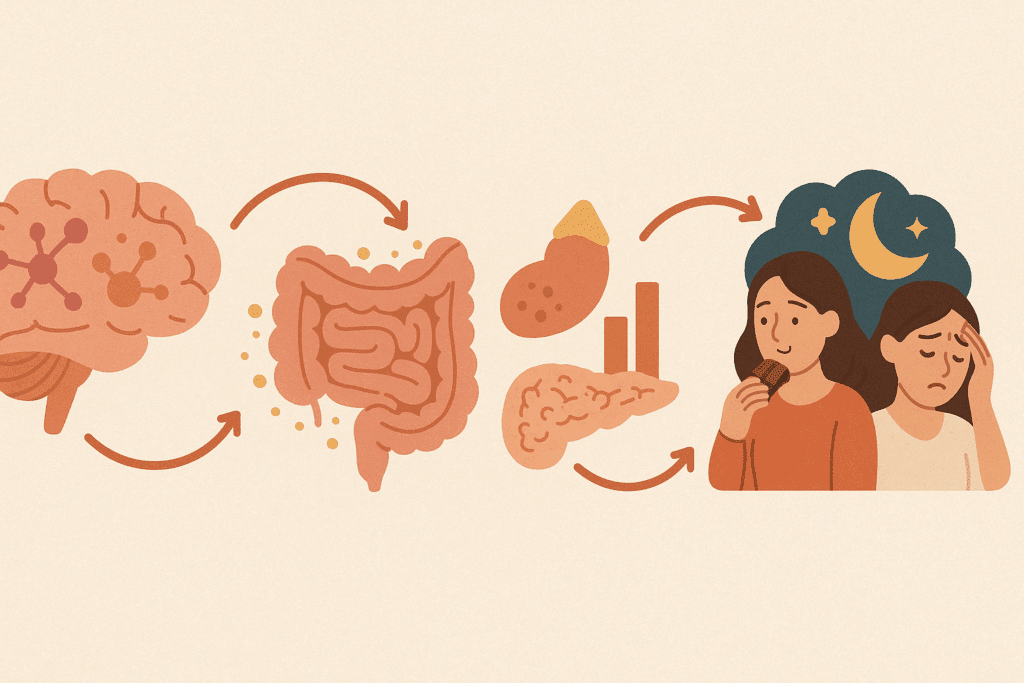
Frequently Asked Questions: Exploring the Link Between Sugar and Anxiety
1. Can reducing sugar intake improve the effectiveness of anxiety therapy or medication?
Yes, reducing sugar can enhance the effectiveness of therapeutic interventions for anxiety. Many medications and therapies target neurotransmitter regulation or stress response, but a high-sugar diet can work against these efforts by perpetuating blood sugar instability and inflammation. When sugar consumption is reduced, the nervous system may become more responsive to treatments like cognitive behavioral therapy or selective serotonin reuptake inhibitors (SSRIs). In individuals with a sugar and anxiety disorder, addressing both the psychological and dietary contributors often results in more sustainable outcomes. Although sugar isn’t the sole cause of anxiety, its reduction can remove a significant physiological barrier to healing.
2. How does sugar affect the stress response differently in people with generalized anxiety disorder?
In people with generalized anxiety disorder (GAD), the body’s stress response is often more sensitive and prolonged. When high amounts of sugar are consumed, it can amplify the adrenal response, triggering an exaggerated release of cortisol and adrenaline. This heightened reactivity may persist longer in those with GAD, increasing symptoms such as restlessness, rumination, and difficulty concentrating. The sugar and anxiety connection is particularly pronounced in this population because their baseline stress levels are already elevated. Minimizing added sugars may help create a more stable internal environment, allowing the nervous system to recover from stress more efficiently.
3. Are natural sugars like honey or maple syrup better for managing anxiety?
While natural sweeteners like honey and maple syrup may have a slightly lower glycemic index than refined sugar, they still impact blood glucose and insulin in ways that can contribute to anxiety. The perception that natural equals harmless can be misleading, especially for those sensitive to blood sugar swings. However, when used sparingly and balanced with fiber, fat, or protein, natural sweeteners may cause less of a spike-and-crash effect. For individuals with a sugar and anxiety disorder, even natural sweeteners should be consumed with mindfulness and moderation. The key is focusing on whole food sources of sweetness—like fruits—which contain fiber and nutrients that buffer blood sugar fluctuations.
4. What are some long-term mental health benefits of cutting back on sugar?
Over time, reducing sugar intake may lead to improved emotional resilience, reduced frequency and intensity of anxiety episodes, and greater mental clarity. The long-term effects of minimizing sugar on mental health go beyond day-to-day mood stability. By decreasing chronic inflammation, supporting balanced neurotransmitter production, and improving sleep quality, individuals often report a greater sense of calm and cognitive control. For those dealing with a sugar and anxiety disorder, these benefits may represent a turning point in managing their condition more holistically. The cumulative impact of dietary change becomes especially meaningful when paired with other wellness practices like mindfulness, exercise, and therapy.
5. Is there a genetic component to how sugar affects anxiety levels?
Yes, genetic factors may influence how individuals process sugar and how it affects their anxiety levels. Variations in genes related to dopamine, serotonin, insulin sensitivity, and inflammation can all modulate the body’s response to sugar. Some people may be more prone to sugar addiction or experience stronger mood swings after sugar consumption due to these inherited differences. For those with a family history of anxiety or mood disorders, understanding genetic susceptibility may help explain a heightened sensitivity to sugar and anxiety triggers. Personalized nutrition approaches, such as nutrigenomics, can help identify these risks and guide tailored interventions.
6. How do cultural eating habits influence the sugar and anxiety connection?
Cultural norms around food can significantly shape how sugar influences mental health. In societies where sugary snacks and desserts are a staple of daily rituals, social gatherings, or emotional expression, it becomes harder to identify sugar as a potential contributor to anxiety. Emotional attachments to traditional sweets may override awareness of physiological symptoms, especially in people with a sugar and anxiety disorder. Additionally, cultural stigma around mental health can prevent individuals from connecting dietary habits with emotional wellbeing. Addressing these challenges often requires culturally sensitive education that honors tradition while introducing healthier ways to enjoy food and manage emotions.
7. Can intermittent fasting or time-restricted eating help break the sugar-anxiety cycle?
Emerging research suggests that intermittent fasting or time-restricted eating may help regulate insulin, improve mood stability, and reduce sugar cravings. By minimizing the frequency of blood sugar spikes throughout the day, these approaches may lower baseline inflammation and support balanced cortisol levels. For individuals caught in a sugar and anxiety cycle, limiting eating windows may reduce the opportunity for impulsive snacking and emotional eating. However, it’s important that any fasting protocol is balanced with adequate nutrient intake and not used as a form of restrictive dieting that increases stress. Consulting a healthcare provider is recommended before beginning any significant dietary regimen, especially for those with preexisting anxiety or metabolic conditions.
8. What overlooked sources of sugar could still impact anxiety symptoms?
Many people focus on eliminating obvious culprits like candy or soda, but sugar often hides in less obvious places. Salad dressings, pasta sauces, flavored yogurts, protein bars, and even some breads contain added sugars that can affect mood and nervous system function. For individuals struggling with sugar and anxiety, overlooking these sources may prevent them from experiencing full symptom relief. Reading labels, preparing meals at home, and choosing unsweetened versions of products are practical steps to identify and reduce hidden sugar intake. Small, consistent changes often lead to the most profound and lasting improvements in anxiety management.
9. How can social media and digital culture amplify the effects of sugar and anxiety?
Constant digital stimulation—like scrolling through social media—already elevates stress and anxiety levels by increasing comparison, fear of missing out (FOMO), and mental overstimulation. When this is combined with the dopamine highs and crashes from sugary snacks often consumed while online, it can worsen emotional dysregulation. Many people in the digital age experience a reinforcing loop between screen time, emotional stress, and poor food choices, deepening their sugar and anxiety disorder symptoms. Creating digital boundaries, practicing mindful tech use, and nourishing the brain with stable fuel sources can help counteract this modern challenge. Building awareness of these environmental triggers is a key part of sustainable lifestyle change.
10. What emerging research areas are exploring sugar’s impact on anxiety?
The relationship between sugar and anxiety is being explored in several cutting-edge areas of science. Neuroinflammation, gut-brain signaling, epigenetics, and the endocannabinoid system are all under active investigation as potential mediators of sugar-induced anxiety. Some studies are also looking at how artificial sweeteners may mimic or differ from sugar’s impact on mood and anxiety-related brain circuits. Additionally, researchers are examining how the timing and frequency of sugar consumption influence long-term mental health trajectories. For people living with a sugar and anxiety disorder, staying informed about these evolving findings may open up new, more personalized avenues for care in the near future.
Conclusion: Rethinking Sugar for a Healthier, Calmer Mind
The relationship between sugar and anxiety is more than a fleeting curiosity—it’s a vital component of understanding how food influences mental health. With mounting evidence supporting the connection between sugar intake and heightened anxiety symptoms, it’s time to shift the conversation from simple calorie counting to a more nuanced, integrative view of nourishment. Sugar impacts brain chemistry, gut microbiota, inflammation, sleep, and stress hormones—all of which directly affect our mental and emotional equilibrium.
For individuals living with a sugar and anxiety disorder, dietary choices can either exacerbate or ease their symptoms. While eliminating sugar entirely may not be necessary or realistic for everyone, becoming mindful of sugar’s impact and reducing added sugars from your daily intake can help regulate mood, promote calm, and restore a sense of internal balance. In a world where anxiety is on the rise, reclaiming control through nutrition may be one of the most accessible and empowering strategies available.
Ultimately, by aligning what we eat with how we want to feel, we begin to close the gap between physical nourishment and emotional well-being. It’s not just about removing sugar—it’s about adding back the nutrients, habits, and awareness that support a calm, focused, and healthy mind.
Was this article helpful? Don’t let it stop with you. Share it right now with someone who needs to see it—whether it’s a friend, a colleague, or your whole network. And if staying ahead on this topic matters to you, subscribe to this publication for the most up-to-date information. You’ll get the latest insights delivered straight to you—no searching, no missing out.
Further Reading:
The impact of sugar consumption on stress driven, emotional and addictive behaviors
Your Anxiety Loves Sugar — Eat These 3 Things Instead
Nutritional psychiatry: Your brain on food
Disclaimer
The information contained in this article is provided for general informational purposes only and is not intended to serve as medical, legal, or professional advice. While NewsHealthWatch strives to present accurate, up-to-date, and reliable content, no warranty or guarantee, expressed or implied, is made regarding the completeness, accuracy, or adequacy of the information provided. Readers are strongly advised to seek the guidance of a qualified healthcare provider or other relevant professionals before acting on any information contained in this article. NewsHealthWatch, its authors, editors, and contributors expressly disclaim any liability for any damages, losses, or consequences arising directly or indirectly from the use, interpretation, or reliance on any information presented herein. The views and opinions expressed in this article are those of the author(s) and do not necessarily reflect the official policies or positions of NewsHealthWatch.

